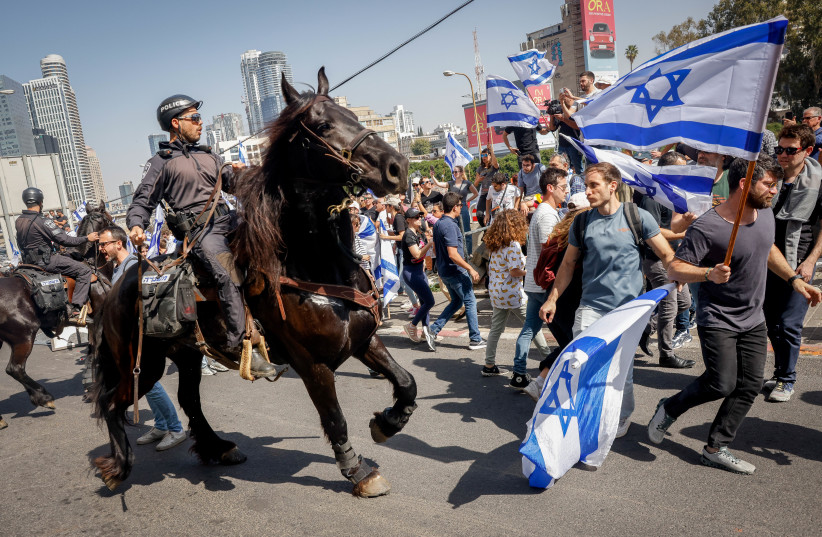National Security Minister Itamar Ben-Gvir should not be involved in police operations to contain the judicial reform protests, National Unity chairman MK Benny Gantz argued in a query sent on Thursday to Attorney-General Gali Baharav-Miara.
"In recent months we are witnessing broad public protest against legislation that the government is advancing regarding the legal system. The protests are occurring while in the background a delegitimization campaign is being led by Knesset members and ministers, including the National Security Minister, who is using the Israel Police and its compounds for political purposes. Ben-Gvir has called the protesters anarchists, and is giving orders to the police's commanders, which is prohibited," Gantz wrote.
Ben-Gvir's police directives
The letter came after Ben-Gvir announced that he would visit the police's operational command center during the day, which was expected to include widespread disruptions, including attempts to block Prime Minister Benjamin Netanyahu's scheduled flight to Rome. Gantz requested that Baharav-Miara prevent the national security minister from making such a visit, as well as clarify to the minister that he cannot give operational orders to the police.
Ben-Gvir later responded, "I gave policy directives to the police. Which methods, which forces, whether or not people will be arrested, if cars will be seized, which I understand the police are considering, these are not my decisions, these are police decisions and I trust them. My policy must be implemented, and my policy is to enable 70,000 people who are passing through here [Ben Gurion International Airport] today, not to have their lives disrupted."
Makor Rishon reported on Thursday evening that Ben-Gvir was unhappy that the police had not done more to ensure public order, quoting a "source close to Ben-Gvir" as saying that they were "very very disappointed with the police's conduct," as it allowed "anarchy" and disrupted the airport's usual functioning.

Gantz's letter was not the first complaint over Ben-Gvir's involvement in the police's operative matters. The Movement for Quality Government in Israel also wrote to Baharv-Miara on Saturday in an "urgent" query over what it argued was Ben-Gvir's illegal intervention in the police's conduct during the previous "day of disruption" last Wednesday.
At Ben-Gvir's demand, the coalition passed at the end of December an amendment to Israel's Police Law, which anchored the Israel Police's subordination to the government, as well as the national security minister's ability to set policy and general principles, and enabled the minister to set policy regarding investigations, after consulting with the Attorney-General, the police commissioner and the officers responsible for investigations.
The Labor Party appealed to the High Court on January 9 against the law, arguing that Ben-Gvir's motives were an attempt to form a "political police" in order to "silence [political opponents], unlawfully take advantage of executive power and critically damage democratic values." A number of civil organizations filed similar appeals.
Another amendment to the Police Law is currently being prepared for its second and third readings. This amendment was broken off from the original amendment to its increased controversiality. The new amendment adds a provision that the police commissioner is "subordinate to the minister", and also said that the minister has the authority to "set policy regarding the duration of treatment of cases," after consulting with the Attorney-General, the police commissioner and the officers responsible for investigations.
